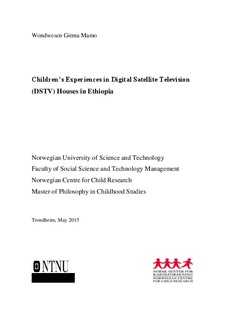| dc.description.abstract | In Ethiopia, the broadcasting of transnational football media, specifically the DSTV football programming, has increasingly reached the local audience including children. These televised football games are presented to the child audience in the DSTV house, which is a newly flourishing house where many children spend a lengthy amount of time. The purpose of this study was to explore different perspectives about the DSTV house, specifically related to the child audience and the children’s experiences in the DSTV house. It was conducted based on more than three months of fieldwork experiences. Data were collected through semi-structured interviews, informal dialogues, participant observation, focus group discussions and ranking methods. In all, 21 participants including children, parents, school directors and DSTV house owners took part in this study.
The results revealed that most of the children first came to the DSTV house with their friends who had already visited and spent time in the DSTV house. Children who took part in my study began attending the DStv house before they were ten years old. The study’s participants including children, parents, owners of DSTV houses and school directors perceived that the DSTV house gave children the opportunity to entertain themselves, to interact with global televised programmes and to learn football skills. However, the participants particularly parents and school directors had doubts about the experiences the DSTV house gave children because children engaged in learning some socially unacceptable things for example, new hairstyles, from the scenes they watched on TV in the DSTV house. However, children were active when they were glocalizing the globalized football contents through the super sport channel of DSTV. Indeed, children also conceived that their involvement in DSTV house led them to have unlikely experiences related to their health, religion, eating patterns and school performance.
The social network children established in the DSTV house with different audiences made them experience relationships and conflict. They formed a relationship, which involved inter-generational and intra-generational relationships with other children and adults including the adult audience, owner of the DStv house and parents. In contrast, children enter conflict with children themselves, the adult audience, owners and their parents resulting from their involvement in the DSTV house. Children used different strategies to negotiate the situations that resulted from power differences between children and adults related to their involvement in the DSTV house. Finally, the study may have implications for improving the DSTV house for children, and directions for future researchers in the area of children’s culture and media use, especially in the Global South. | nb_NO |
